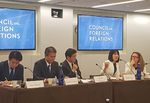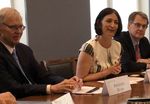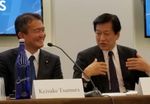US-Japan Parliamentary Exchange Program - 2019 Delegation to the United States
←
→
Page content transcription
If your browser does not render page correctly, please read the page content below
US-Japan Parliamentary Exchange Program
2019 Delegation to the United States
SEPTEMBER 2019
On September 17–20, JCIE’s 30th delegation of Diet While in the United States, the delegates met with
members visited the United States. Representing both seven Congressional members and a diverse array of
the ruling and opposition parties, the parliamentarians senior government officials and NGO leaders to ex-
traveled together with a JCIE study team comprised of change views on US-Japan security and trade issues
Japanese experts on democratic governance for a series and to discuss lessons learned by US institutions en-
of high-level meetings and roundtables in Washington gaged with democracy assistance. Toward the end of
DC. The group met with more than 50 American and the week, they were also featured as speakers at the
Japanese leaders to exchange views on US-Japan re- fifth Tadashi Yamamoto Memorial Seminar, hosted
lations, as well as to explore the potential for greater by the Council on Foreign Relations, where they dis-
cooperation in support of democratization in Asia. The cussed the theme of the program, “Japan in the World:
exchange was part of a project that JCIE began in 2018 Sustaining Democracy,” and talked more broadly about
on “Expanding Support for Democratic Governance.” Japan’s domestic political situation.
Diet members with Rep. David Price, Rep. Adrian Smith, and Rep. Bill Senator Cory Gardner discusses US-Japan relations and the future of
Flores from the House Democratic Partnership Asia with the delegation2
KEY POINTS OF DISCUSSION
PARTICIPANTS
Domestic Politics in the US and Japan Hon. Toshiko Abe, Member, House of Representatives
(Liberal Democratic Party–LDP)
Members of the delegation understandably were curi-
Dr. Takako Hikotani, Professor, Columbia University
ous about the views of those they met in Washington
Dr. Maiko Ichihara, Associate Professor, Hitotsubashi
DC on the current US political situation, what might University
happen in the upcoming 2020 election, and expec- Hon. Shu Sakurai, Member, House of Representatives
tations for new US legislation. The response from (Constitutional Democratic Party)
those looking in from the outside—journalists, policy Dr. Kaori Shoji, Professor in American Politics,
Gakushuin University Faculty of Law
experts at think tanks, and Japanese business lead-
Hon. Hiromi Takase, Member, House of Councillors
ers—was largely one of uncertainty over the direc- (Komeito)
tion of US policy moving forward. Although the trip Amb. Yukio Takasu, Special Advisor on Human
took place one week before Speaker Nancy Pelosi Security to the UN Secretary General; former UN
announced an impeachment inquiry, it was already Under-Secretary General for Management; former
Japanese Ambassador to the United Nations
clear that partisan divisions and the upcoming elec-
Hon. Keisuke Tsumura, Member, House of
tion meant significant Congressional action would be Representatives (Democratic Party for the People)
unlikely until after 2020. This was emphasized during Hon. Tsuyoshi Yamaguchi, Member, House of
a lunch with journalists, including two former JCIE Representatives (LDP)
Journalism Fellows, who felt the only legislation ex-
pected before the end of the year might be the ratifica- Mr. James Gannon, Executive Director, Japan
tion of the United States–Mexico–Canada Agreement Center for International Exchange (JCIE/USA)
Dr. Atsuko Yokobori Geiger, Fellow, JCIE/USA
(USMCA).
Ms. Hideko Katsumata, Executive Director &
On the other hand, there was also interest from
COO, JCIE/Japan
the US side in Japan’s own domestic political situ- Mr. Stephen McHugh, Assistant Program Officer,
ation, and whether a strong opposition will emerge JCIE/USA
once Prime Minister Abe’s term potentially comes to
an end in 2021. These topics rose to the forefront at
the Tadashi Yamamoto Memorial Seminar during a US-Japan Cooperation in Asia
session on the state of Japanese politics. In general, The trip came at a time of serious protests and civil
there was a feeling that Japan’s politics seem much unrest in Hong Kong, showcasing the seeming col-
healthier, although there was also some concern about lapse of the one country, two systems principle. As
the weakness of Japan’s opposition parties. such, Hong Kong and the influence of China’s Belt
and Road Initiative were a frequent topic of discus-
sion, offering a reminder that a strong US-Japan re-
lationship will be vital in curbing China’s influence.
There was a great deal of praise for Japan’s role in
developing the concept of the Free and Open Indo-
Pacific Strategy (FOIP), which has been adopted as
official policy in both Japan and the United States,
demonstrating that, despite some conflicts over trade
issues and America’s withdrawal from the Trans-
Pacific Partnership (TPP), the two countries are still
important partners in the region.
The message the delegation heard on US for-
eign policy was that, President Trump’s fiery rheto-
National Endowment for Democracy President Carl Gershman ric notwithstanding, there is still more continuity
explains how the United States supports democratic governance3
than is commonly acknowledged. Of course, there Numerous legislators on the US side from both par-
are some exceptions to this, such as the administra- ties expressed their disappointment that the United
tion’s approach to Iran, but overall there has been States had withdrawn from TPP, but added that the
significant bipartisan agreement over issues such as way Japan has stepped up in the aftermath of that de-
how to handle China and the need for stability in cision was impressive. Japan’s conclusion of a multi-
foreign assistance. The group witnessed this bipartisan lateral trade agreement with the European Union was
approach firsthand when five members of the House also lauded. The Japanese participants also expressed
Democratic Partnership (HDP)—from both sides regret over the US exit from TPP and shared their
of the aisle—met with the delegation to discuss concern that China may now be looking on with in-
their work. terest at the space left behind in the partnership by the
The escalating tensions between Japan and South United States.
Korea, which saw Korea withdraw from a bilateral
intelligence-sharing pact in August after growing
trade tensions, were also on many people’s minds. US-Japan Cooperation on Democracy
The message from US government officials about this Support
situation was that, from the US perspective, there was An underlying theme throughout all of the groups
a desire to see the situation resolved as soon as pos- meeting’s was the strong desire to see greater coop-
sible. There was a feeling that a strong trilateral rela- eration between Japan and the United States in East
tionship between Japan, the US, and South Korea was Asia in the area of democracy support. US foreign
of key importance for security and trade relations in policy organizations pointed out that democracy sup-
the region. For example, Senator Cory Gardner spoke port should be seen as part of a broader, long-term
about the Asia Reassurance Initiative Act (ARIA), national security strategy given that stable neighbors
which features trilateral cooperation with Japan and equate to a more stable region. Study group members
Korea as one of the key facets for promoting US se- pointed out that Japan is in fact already doing work in
curity interests in the Indo-Pacific. support of democratization, although it has not nec-
essarily been described using that terminology. They
Trade in the Aftermath of TPP also noted that the work of the Japan International
Trade relations between Japan and the United States Cooperation Agency (JICA) often covers activities
were of course another key topic in discussions. One such as technical support for elections or rule of law
member of Congress pointed out that trade is often assistance, both of which JICA’s counterpart in the
the vehicle for politicians to demonstrate the im- United States, USAID, would typically consider as
portance of foreign policy to constituents at home. falling under the umbrella of democracy assistance.
CSIS Senior Fellow Mike Green makes a point during discussion Hiromi Takase speaks at the Tadashi Yamamoto Memorial Seminar4 US groups emphasized that Japan has been one The trip featured meetings across the spectrum of the most stable democracies in the East Asia re- of governmental, quasi-governmental, and non- gion since the late 1940s and is now seen as a model governmental organizations (NGOs) that work in of democratic success for other Asian countries. US this field. The delegation met with board members think-tank experts identified some of the comparative and top leadership at the National Endowment for advantages Japan might have in this field over the Democracy, where it learned how the organization United States. As a parliamentary democracy, Japan receives funding from Congress and how it is able to offers a different model for democratic governance act as an umbrella organization for its two core in- that is often closer to other countries in East Asia and stitutes, the National Democratic Institute (NDI) and it has a lot to teach about parliamentary procedure, the International Republican Institute (IRI). They the establishment of a strong, independent judiciary, also met with the presidents of these two institutes and other aspects of democratic governance. In addi- to discuss the work they are doing in Asia. Site vis- tion, Prime Minister Abe’s emphasis on women’s em- its to these organizations as well as to such NGOs as powerment might make this a natural area for Japan Freedom House inspired the delegation to start think- to focus on funding in other countries. Overall, there ing about what efforts are needed to build up Japanese was a lot of positivity about Japan’s ability to have a expertise on democracy support as well. strong impact if it decides to further engage in support for democratization. Tsuyoshi Yamaguchi speaks at the Council on Foreign Relations Members of the delegation in front of the White House Richard Bush, Mireya Solis, and Jonathan Stromseth at The Brookings NDI President Derek Mitchell, IRI President Dan Twining, and senior Institution roundtable on governance in Asia IRI and NDI staff discuss their work
PROGRAM
Tuesday, September 17 Jim Heller, Director, Japan Desk, Bureau of East Asian and
Pacific Affairs, US Department of State
Orientation Lunch
Briefing by Journalists on the Prospects for American Politics
The US Approach to Democracy Assistance
Natalie Andrews, Congressional Reporter, Wall Street Journal
Thomas Carothers, Senior Vice President for Studies, Carnegie
Endowment for International Peace Christian Caryl, International Opinions Editor, The Washington
Post; Editor, DemocracyPost Blog
Brookings Institution Roundtable on Governance in Asia
Byron Tau, Justice Department & FBI Reporter, Wall Street
Mireya Solis, Philip Knight Chair in Japan Studies, Brookings Journal
Institute
Roundtable Discussion with the US-Japan Congressional
Richard Bush, Senior Fellow, Director, Center for East Asia Caucus & the House Democracy Partnership
Policy Studies (CEAP), Brookings Institute
Bill Flores, Member, House of Representatives (R-TX)
Jonathan Stromseth, Lee Kuan Yew Chair in Southeast Asian
Studies, Brookings Institute Robin Kelly, Member, House of Representatives (D-IL)
Dinner with US-Asia Specialists David Price, Member, Member, House of Representatives
(D-NC); Chairman of the House Appropriations
Emma Chanlett-Avery, Specialist in Asian Affairs, Subcommittee on Transportation, Housing and Urban
Congressional Research Service Development; Co-chair, House Democracy Partnership
Shihoko Goto, Deputy Director for Geoeconomics & Senior Adrian Smith, Member, Member, House of Representatives
Associate for Northeast Asia, Wilson Center (R-NE); Co-chair, US-Japan Congressional Caucus
Michael Schiffer, Senior Advisor and Counselor, Senate Foreign Norma Torres, Member, House of Representatives (D-CA)
Relations Committee; former Deputy Assistant Secretary of
Defense for East Asia Derek Luyten, Executive Director, House Democracy
Partnership
James Schoff, Senior Fellow, Asia Program, Carnegie
Endowment for International Peace Nils Mueller, Staff Director, House Democracy Partnership
Visit to US Senate Gallery & Tour of US Capitol Building
Wednesday, September 18 Visit to Japanese-American Memorial
Japanese Business Leader Briefing on US-Japan Relations Sunnylands Foundation/NED/JCIE Dinner on US-Japan
Cooperation on Democracy
Yoichi Mineo, Vice President & General Manager, Marubeni
America Corporation Carl Gershman, President, National Endowment for Democracy
(NED)
Saori Tsuchiya, General Manager, Government Affairs, Toyota
Motor North America Elizabeth Hoffman, Senior Manager for Government Affairs,
NED
Hiroyuki (Bob) Takai, Senior Vice President & General
Manager, Sumitomo Corporation Washington DC office David Lane, President, Annenberg Family Trust at Sunnylands;
former US Ambassador to the United Nations Agencies for
Center for Strategic & International Studies Discussion on Food and Agriculture
US-Asia Relations
Lynn Lee, Associate Director, NED
Michael Green, Senior Vice President for Asia and Japan Chair,
Center for Strategic & International Studies (CSIS); former Jeffrey Phillips, Policy Director, Annenberg Family Trust at
Special Assistant to the President for National Security Sunnylands
Affairs and Senior Director for Asia, National Security
Council Raul Ruiz, Member, House of Representatives (D-CA)
Nicholas Szechenyi, Deputy Director and Senior Fellow, Japan
Chair, CSIS
Thursday, September 19
US Department of State
2019 Tadashi Yamamoto Memorial Seminar at the Council on
Marc Knapper, Deputy Assistant Secretary for Korea and Japan, Foreign Relations
Bureau of East Asian and Pacific Affairs, US Department of
State Opening RemarksSheila Smith, Senior Fellow for Japan Studies, Council on Friday, September 20
Foreign Relations
Supporting Democratic Unity – Discussion with National
James Gannon, Executive Director, JCIE/USA Endowment for Democracy Leadership and Board
Members
Panel 1: Japan’s Role in Democracy Promotion
Carl Gershman, President, National Endowment for
Presider: Sheila Smith
Democracy (NED)
Yukio Takasu, Special Advisor on Human Security to the UN
Barry Jackson, Strategic Advisor, Brownstein Hyatt Farber
Secretary General; former UN Under-Secretary General
Schreck; Managing Director, The Lindsey Group LLC;
for Management; former Japanese Ambassador to the
former Chief of Staff to Speaker John Boehner
United Nations
Ken Wollack, Director, Commission on Presidential Debates;
Maiko Ichihara, Associate Professor, Graduate School of
former President, National Democratic Institute
Law and the School of International and Public Policy,
Hitotsubashi University Senior Staff Briefing on National Endowment for
Democracy’s Operations
Derek Mitchell, President, National Democratic Institute
Jodi Herman, Vice-President of Government Relations and
Panel 2: The State of Japanese Politics
Public Affairs
Presider: Sheila Smith
Chris Walker, Vice-President for Studies and Analysis
Tsuyoshi Yamaguchi, Member House of Representatives
John Knaus, Senior Director for Asia
Keisuke Tsumura, Member, House of Representatives
Lynn Lee, Associate Director
Shu Sakurai, Member, House of Representatives
Wilson Lee, Senior Program Officer, Asia Program
Hiromi Takase, Member, House of Councillors
Lunch Discussion: The Work of the US Democracy
Meeting with Senator Cory Gardner Institutes
Cory Gardner, Member, US Senate (R-CO); Chairman, US Derek Mitchell, President, National Democratic Institute;
Senate Foreign Relations Subcommittee on East Asia, the former US Ambassador to Myanmar
Pacific, and International Cybersecurity
Daniel Twining, President, International Republican Institute
Briefing by Senior USAID Staff
Rhonda Mays, Deputy Director, Asia Division, International
Kaush Arha, Senior Adviser, Bureau for Policy, Planning and Republican Institute
Learning (PPL)
Manpreet Sing Anand, Regional Director for Asia Pacific,
Meghan Holohan, Program Analyst, PPL National Democratic Institute
Chris Maloney, Assistant to the Administrator, PPL Tour of the National Democratic Institute
Wendy Marshall, Democracy, Governance, Peace, and Tess Pantow, Administrative Manager for Asia, NDI
Security Team Leader , Asia Bureau Technical Services
Eunice Yoo-Jung Ha, Senior Program Manager for Asia, NDI
Office.
Tim Meisburger, Director of the Democracy, Human Rights,
and Governance (DRG) Center of Excellence
Bob Powers, Deputy Assistant Administrator, PPL
Anne Marie Yastishock, Deputy Assistant Administrator for
Asia
Site Visit to Freedom House
Lisa Dickieson, Senior Vice President for Programs,
Freedom House
Jon Temin, Director, Africa Programs, Freedom House
David Timberman, Asia Regional Director, Freedom House
Embassy Dinner hosted by Ambassador Shinsuke SugiyamaYou can also read


























































